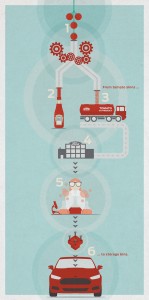
Researchers at Ford and Heinz are investigating the use of tomato fibers in developing sustainable, composite materials for use in vehicle manufacturing.
Your next Ford might make you crave French fries, or at least make you think of them when you realize part of the car may be made from dried tomato skins from the H.J. Heinz Co.
Researchers at Ford and Heinz, perhaps best known for its ketchup, are exploring ways to use the skins in certain applications, specifically wiring brackets and storage bins for holding coins or other small objects.
“We are exploring whether this food processing byproduct makes sense for an automotive application,” said Ellen Lee, plastics research technical specialist for Ford. “Our goal is to develop a strong, lightweight material that meets our vehicle requirements, while at the same time reducing our overall environmental impact.”
Ford’s been attacking the effort to produce greener products through using renewable resources, such as the tomato skins, but also it’s looking to make its vehicles lighter to improve gas mileage and improve emissions as part of its “Blueprint for Sustainability.”
Last week, the maker displayed its ultra-lightweight Fusion concept that makes use of aluminum and other materials to drop a full 800 pounds compared to the current Fusion. And though there are no immediate plans to put the prototype into production, it will influence future product development programs.
Ford and Heinz dry the skins, then they are ground and combined with a polypropylene and cooked. The resulting material is usable in some applications, but it is not strong enough for structural materials. It also has another downside: it is not visually appealing.
So for now, it’s likely to find its way into parts not seen very often, such as the aforementioned wiring and storage bins. It could also be used for under-hood plastics and shields in the underbody. The teams are working on making it more appealing.
Ford has long tried to find alternative, ecologically friendly materials to use in automotive applications. It recently began using recycled cotton in its seat covers and carpets and has used soybeans in the production of seating foam and coconut-based composite materials.
Last year, it began using cellulose fiber-reinforced console components and rice hull-filled electrical cowl brackets expanding Ford’s bio-based portfolio to eight materials in production.
(Toyota repeating, expanding airbag problem. For more, Click Here.)
The current partnership came together as Heinz was looking for a way to recycle or repurpose the peels, stems and seeds from the tomatoes it uses in the production of its tomato-based products, especially ketchup.
(Click Here for details on how much more Americans would pay to fix roads.)
“We are delighted that the technology has been validated,” said Vidhu Nagpal, associate director, packaging R&D for Heinz. “Although we are in the very early stages of research, and many questions remain, we are excited about the possibilities this could produce for both Heinz and Ford, and the advancement of sustainable 100% plant-based plastics.”
(To see more about Ford’s environmental efforts, Click Here.)
Ford and Heinz, as well as Coca-Cola, Nike and Procter & Gamble, agreed to work together to develop polyethylene terephthalate (PET) materials and fiber for use in their products. PET is a lightweight plastic that is used for plastic bottles, fabrics, carpets and other products.
Additionally, Ford and Heinz were part of a group that joined with the World Wildlife Fund to create the Bioplastic Feedstock Alliance. The new group aimed to use plant products, such as switch grass, corn and sugar cane, to develop plastic products. It was out of that partnership that the current research program involving tomatoes began.
